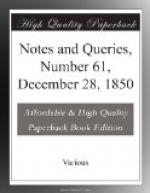“In ipsa quoque urbe de medicorum sententia plerique unguentis suavissimus nares atque aures opplebant, suffituque[3] et odoramentis assidua utebantur, quod meatus sensuum (ut quidem dicunt) odoribus illis occupati, neque admittant aera tabificum: et si maxime admiserint, tamen eum majore quasi vi longe superari.”
This has nothing to do with the practice of smoking, nor is it clear that they smoked these things with a pipe into the mouth at all. The medical use of fumigation, as Sir William Temple observes, was greatly esteemed among the ancients. But it is very probable that, being sometimes practised by means of pipes, it was what led to the practice of smoking constantly, either for general medical protection, or merely for luxury, in countries and times too, when these epidemics from bad air were very common. The great love of smoking among the Turks may be originally owing to the plague.
C.B.
[Footnote 3: [Greek: “thumiamasi te kai aromasi sunechos echronto."]]
Antiquity of Smoking (Vol. ii., pp. 41. 216. 465.).—Mr. Lane, in his edition of the Arabian Nights, infers the very late date of that book from there being no mention of tobacco or coffee in it.
As two of the ancient authorities have broken down, it occurred to me that others might.
The reference to Strabo, vii. 296. leads me only to this; that the Mysians were called [Greek: kapnobatai] (some correct to [Greek: kapnopatai]) because they did not eat animals, but milk, cheese, and honey; but of religion, living quietly.
One cannot imagine that this can be meant. I referred to Almaloveen’s edition, the old paging.
In the next page he repeats the epithet, coupling it, as before, with the word religious, and arguing from both as having the same meaning.
It occurred to me that somebody might have read [Greek: kapnopotai], “fumum bibentes,” which might have given occasion to the reference to this passage: and I find in the English Passow that [Greek: kapnobotai], “smoke-eaters,” has been proposed.
[Greek: Kapnopatai], is there derived from [Greek: paomai].
But if these are the readings, they can have nothing to do with smoking, but with religion. From the context they would mean as we say, “living on air;” like Democritus, who subsisted three days upon the steam of new loaves.
[Greek: Kapnobatai] meant, as I believe, to describe their religiousness more directly; treading on the clouds, living in the air: like Socrates in Aristophanes, [Greek: Neph]. 225.:
[Greek: “Aerobato kai periphrono ton helion,”]
And in v. 330. [Greek: kapnos] is used of the clouds:
[Greek: “Ma Di
all homichlen kai droson autas hegoumen kai kapnon
einai.”]
There is nothing in Solinus, cap. 15.; and Mela, lib. ii., is too wide a reference.
C.B.




